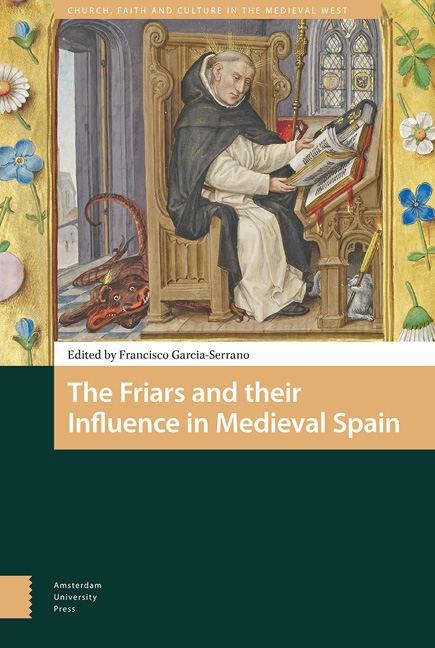Book contents
- Frontmatter
- Contents
- Abbreviations
- List of Illustrations
- Acknowledgements
- Introduction
- 1 Dominicus Hispanus
- 2 Ramon de Penyafort and His Influence
- 3 The Mendicant Orders and the Castilian Monarchy in the Reign of Ferdinand III
- 4 Ramon Marti, the Trinity, and the Limits of Dominican Mission
- 5 Narrative and Counter-Narrative: Dominican and Muslim Preaching in Medieval Iberia
- 6 The Poor Clares of Alcocer and the Castilian Crown (Thirteenth to Fifteenth Centuries)
- 7 Friars and Nuns: Dominican Economy and Religious Identity in Medieval Castile
- 8 Networks of Dissent and the Franciscans of the Crown of Aragon
- 9 Faction, Politics, and Dominican Inquisitors in the Fourteenth-Century Crown of Aragon
- 10 Sutzura e Viltat Carnal: The Place of Sin and Lust in the Treatises of the Franciscan Francesc Eiximenis (c.1400)
- 11 Valencian Dominicans Beyond the Convent of Santo Domingo
- 12 Ferdinand of Antequera and Santo Domingo el Real de Toledo: Patronage, Advice, and Spiritual Favour (c.1390–1416)
- Index
Introduction
Published online by Cambridge University Press: 16 February 2021
- Frontmatter
- Contents
- Abbreviations
- List of Illustrations
- Acknowledgements
- Introduction
- 1 Dominicus Hispanus
- 2 Ramon de Penyafort and His Influence
- 3 The Mendicant Orders and the Castilian Monarchy in the Reign of Ferdinand III
- 4 Ramon Marti, the Trinity, and the Limits of Dominican Mission
- 5 Narrative and Counter-Narrative: Dominican and Muslim Preaching in Medieval Iberia
- 6 The Poor Clares of Alcocer and the Castilian Crown (Thirteenth to Fifteenth Centuries)
- 7 Friars and Nuns: Dominican Economy and Religious Identity in Medieval Castile
- 8 Networks of Dissent and the Franciscans of the Crown of Aragon
- 9 Faction, Politics, and Dominican Inquisitors in the Fourteenth-Century Crown of Aragon
- 10 Sutzura e Viltat Carnal: The Place of Sin and Lust in the Treatises of the Franciscan Francesc Eiximenis (c.1400)
- 11 Valencian Dominicans Beyond the Convent of Santo Domingo
- 12 Ferdinand of Antequera and Santo Domingo el Real de Toledo: Patronage, Advice, and Spiritual Favour (c.1390–1416)
- Index
Summary
The mendicant orders arrived in the Iberian Peninsula during the early thirteenth century and from then on they had a great impact on Church and society in all of the Spanish kingdoms. In particular, the Dominicans, whose founder was an Augustinian canon of Osma in Castile, and the Franciscans, who during Francis of Assisi's lifetime were already very active in the Peninsula, were to have an enormous influence, pervading almost every aspect of the society of late medieval Spain. Due to the peculiarity of the Iberian frontier, where religions coexisted, the dynamic expansion of the friars was not restricted to Christian territory; the papacy sent Dominicans and Franciscans to al-Andalus, Morocco, and Tunisia, where they became the first bishops, evangelizing the Muslims and serving the spiritual and material interests of Christian kings, merchants, and mercenaries.
The northern territories of the Iberian kingdoms, in tune with the medieval West, were undergoing a significant transformation. As a result of the commercial revolution of the High Middle Ages, Western European society changed dramatically and the urban centres, led by an active emerging merchant community, became dominant for the first time since the end of the Roman Empire. The general amelioration of the economic situation allowed the inhabitants of cities, towns, and important villages to change their living patterns by altering their values and by providing new channels for social interaction. While the inhabitants of small rural villages maintained close relations with one another, human interaction in urban centres became more complex and anonymous, and a new spirituality began to surface alongside the more diversified material and social expectations brought about by commerce. Following this tendency, Francesc Eiximenis, the Aragonese Franciscan, described the city as the perfect setting for human life, a sort of earthly paradise.
The friars also contributed to the transformation of urban life in many Iberian towns, becoming themselves an essential part of the fabric of the late medieval city. It was in the urban space that the friars intertwined with the merchant class and nascent bourgeoisie by preaching and teaching them how to counteract the worldly vitality associated with the cities. Correspondingly, the inhabitants of these urban centres were eager to accept the new spirituality brought about by the friars, a spirituality that justified their wealth and that was better suited to those who lived in a profit economy.
- Type
- Chapter
- Information
- The Friars and their Influence in Medieval Spain , pp. 13 - 18Publisher: Amsterdam University PressPrint publication year: 2018



